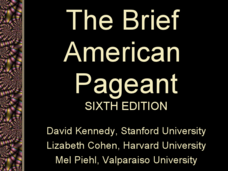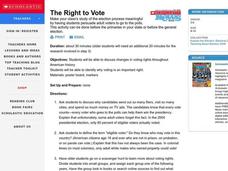Curated OER
Cartoons for the Classroom: Celebrating the 19th Amendment
Eighty-eight years after women earned the right to vote, a women ran for president. Young analysts consider the role women play in politics, how they are portrayed, the standards they are held to, and if they are still treated unfairly...
Curated OER
The Brief American Pageant: The Resurgence of Conservatism
Take a short trip back in time with this presentation, which details the political and electoral contexts of 1980's and 1990's America. Covering the Gulf War as well as domestic economics, these slides feature easy-to-read charts and...
Curated OER
We the People: A Study in American Voter Turnout: US Government
Learners examine and compare voter turnout in US Elections. They write a letter to a favorite candidate or representative suggesting ways to increase voter turnout.
Curated OER
The Election Is in the House: Was There a Corrupt Bargain?
Students take a stand, supported by evidence, on whether there was a "corrupt bargain" between Henry Clay and John Quincy Adams.
Curated OER
The Brief American Pageant: The Stormy Sixties
Intended for use with The American Pageant by David Kennedy, Lizabeth Cohen, and Mel Piehl, this slideshow includes maps and graphs that detail politics and social dynamics in 1960's America. The textbook is not necessary for...
Curated OER
Voting in Violence
Students create K/W/L (Know/Want to Know/Learned) charts to study the political violence following Kenya's 2008 presidential elections. They draw connections between this and other events currently taking place around the world.
Curated OER
Social Demographics and Election Statistics
Students identify the type of data contained in a spreadsheet. They manipulate a spreadsheet of presidential election returns. Students develop the skills to use the Microsoft Excel program.
Curated OER
Should Kids Vote?
Students develop critical analysis skills important to evaluate democratic structures. They increase their knowledge of the characteristics of voters and voting impact on the Electoral System.
Curated OER
Religion and Politics: The Battle Over the Judiciary
Learners analyze the relationship between religion an politics. In this Supreme Court lesson, students examine the results of the 2004 presidential election and explore how the results impacted George W. Bush and his Supreme Court...
Curated OER
Reading Comprehension: Who Elects the President?
In this reading comprehension instructional activity, students read a text about the presidential election in 2000. Students fill in 10 blanks, choosing from 4 words for each that will make the text make sense.
Curated OER
All Aboard The Campaign Train!
Learners explore campaign politics. In this political campaign lesson, students investigate multimedia sources in order to examine the structure of political parties and platforms from previous presidential elections. Learners then...
Curated OER
The Electoral College
Students examine the Electoral College's role in the election process. They conduct Internet research, and identify the elections in which the Electoral College played a deciding role.
Curated OER
Campaign 2000
Students research newspapers and the Internet to learn about the election. Students work in groups and choose a state that they want to compare to Florida. Students organize the data they have found into a graph labeling an "x" and "y"...
Curated OER
The Right to Vote
In this voting worksheet, students identify and discuss changes in voting rights throughout American history.
Then, they identify why voting is an important right for Americans. Finally, students create voting bookmarks instead of or in...
Curated OER
When the Personal Becomes Presidential
Students explore American voter's attitudes toward the checkered pasts of presidents and presidential candidates. They create and conduct a survey of members of their school community and analyze the results.
Curated OER
Targeting Faith When It Counts
Students explore the relationship between politics and religion. In this religion and ethics lesson, students examine hyperlinks created by their instructor from the suggested sites list. Students research the websites for information...
Curated OER
A Race to Watch: Campaign 2008, The Role of Technology and the Internet
Students listen to a statement about the role the Internet plays in the political process and respond by placing a card under the appropriate agree/disagree sign at the front of the room. Students brainstorm reasons to select their...
Curated OER
Covering the Campaign Trail: Technological Progress or Temporary Chaos?
Students study the changes in reporting and journalism techniques that have evolved due to advances in technology by reading an online transcript. They debate whether the technological advances are positive or negative in the reporting...
Curated OER
Our Country
Second graders study about being a citizen in a democracy. They also study about the important American symbols and the process for electing the President. Students develop a creative writing story and create a drawing of a room....
Curated OER
Government 13.1 and 13.2
In this government worksheet, students answer 10 fill in the blank questions and 10 short answer questions regarding presidential powers.
Curated OER
Electoral Politics
Students formulate their own opinions about the issues in an election campaign through a critical examination of political advertisements, candidate debates, and political cartoons.
Curated OER
Where Do They Stand?
In this presidential election worksheet, students research the 2008 presidential candidates and create a booklet of candidate profiles that clearly differentiate each one. They also assume the identity of one of the candidates and hold a...
Curated OER
Cartoons for the Classroom: Comparing Democracies
In this current events worksheet, students analyze a political cartoon about elections in Zimbabwe and respond to 3 talking point questions.
Curated OER
POLITICS AND RELIGION: Targeting Faith When It Counts
Learners research current articles about the influence of religion on the presidential election of 2004.

























